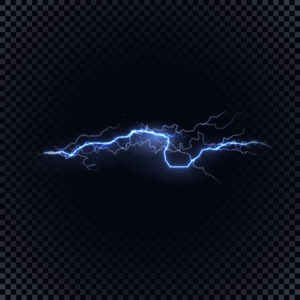Electrical Safety at Home: Isn’t Safe Better Than Sorry?

Blue vector lightning on black background, vector illustration
Electricity is something society takes for granted, until it goes out because of a bad thunderstorm, an industrial accident or, in Florida, an osprey building a nest atop a power pole. Even though as a society we are enjoying the most reliable and cheapest electricity suppliers to date… All three scenarios have at some point caused consumers to spend time in the dark.
Those energy-fueled waves of current that power televisions, washing machines, ovens, pool pumps, air-conditioners and cell-phone chargers are part of daily life. At the same time, they can be part of daily death, as it is estimated nearly 400 fatalities occur each year by electrocution and 500 from electrical fires.
“Many electrocutions and home fires can be prevented simply by understanding basic electrical safety principles and adhering to safe practices,” according to the Electrical Safety Foundation International (ESFI), a nonprofit that promotes and raises awareness of electrical safety at home. “ESFI has developed a number of resources to help educate homeowners, consumers, older adults, and children.”
One of the first tips is to always hire a licensed electrician for any repairs or upgrades to switches and wires. Hiring someone who is not licensed – or attempting a do-it-yourself job – is a risk that is not worth the reward of saving a few bucks and potentially putting one’s home and family in harm’s way while doing so.
“Working with electricity requires thorough planning and extreme care, and cutting corners can be a costly mistake,” ESFI states on its “Do-It-Yourself (DIY) Electrical Safety” page. “ESFI strongly recommends hiring a qualified, licensed electrician to perform any electrical work in your home. However, if you decide to do-it-yourself, consider these important safety tips before undertaking any home electrical project:
“Make an effort to learn about your home electrical system so that you can safely navigate and maintain it,” according to ESFI. “Never attempt a project that is beyond your skill level. Knowing when to call a professional may help prevent electrical fires, injuries, and fatalities. Always turn off the power to the circuit that you plan to work on by switching off the circuit breaker in the main service panel. Be sure to unplug any lamp or appliance before working on it. Test the wires before you touch them to make sure that the power has been turned off. Never touch plumbing or gas pipes when performing a do-it-yourself electrical project.”
It only takes a little electricity to cause injury or death. The numbers prove it. The lesson to be learned is better safe than sorry.
“Just as regular wellness checkups are critical for maintaining your health, routine safety checkups are critical for the safety of your home,” according to ESFI’s “Give Your Home an Electrical Safety Checkup” page. “Use ESFI’s handy Electrical Safety Checkup list to ensure that you can identify and correct potential electrical hazards around your home before an electrical fire or incident can result.”
- Here are more safety tips:
- Are outlets in good working order? If not, that indicates wear and tear on the wires, a definite hazard.
- Are outlets hot to the touch? If so, a red flag should be raised to have them replaced.
- Are outlets discolored or appear to have burn marks on them? If so, heat is building up, and something is faulty.
- Do switches make noise when flipped on and / or off? Do they buzz, crackle or sizzle? If so, the connection is loose and dangerous.
- Do plugs fit firmly into outlets? If not, and there is wiggle room, it can cause a fire.
- Are cords to lamps – or any appliance in the home – frayed or split? If so, don’t use them until they are replaced.
- Are lamps equipped with the correct bulbs in terms of maximum wattage? Don’t put a 150-watt bulb into a lamp stamped with a 75-watt maximum.
- Limit use of extension cords.
“Roughly 3,300 home fires originate in extension cords each year, killing 50 people and injuring 270 more,” ESFI states on its “Reaching to Safety: Use Extension Cords Properly” page.
Here are some more safety tips pertaining to extension cords:
- Do not plug one extension cord into another to make it longer. Get the right size.
- Check to see whether extension cords are certified and rated for their use. Indoor or outdoor? Do they meet the power standards of the accompanying electrical device?
- If several extension cords are in use throughout the house, take time to think why. Does the home have too few outlets? If so, hire an electrician to add outlets where they are needed.
- Never use extension cords with oscillating fans or space heaters, as they will overheat.
Share This


